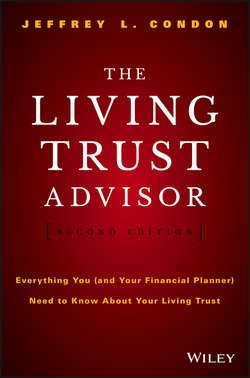Читать книгу The Living Trust Advisor - Condon Jeffrey L. - Страница 18
На сайте Литреса книга снята с продажи.
The First Quarter
Establishing Your Living Trust
CHAPTER 3
Do You Really Need a Living Trust?
Or, Don’t Let Someone Sell You Something You Don’t Need
Putting Your House in Joint Tenancy with Your Child Is This Side of Insanity
ОглавлениеYou have to be mad, or manipulatively persuaded by a self-serving beneficiary, to put your children’s names on the title to your house or any other real property that you own, because when you put your house in your child’s name, you now subject your house to their financial burdens and risks in life. For example:
• Divorce: What if your daughter gets a divorce? Your son-in-law will claim that he has an ownership interest in the portion of your house in your daughter’s name. He may not succeed, but your house becomes part of your daughter’s divorce settlement. And as we lawyers say, who knows what some crazy judge will do?
Or perhaps your son puts his share into the joint names of himself and his wife. Love today is a divorce tomorrow, and your ex-daughter-in-law walks away with a portion of your house.
• Bankruptcy: What if your son files for bankruptcy? The bankruptcy trustee will attempt to attach your house as an asset that can be used – that is, sold– to pay off your son’s creditors.
• The Internal Revenue Service (IRS): What if your daughter gets into a tussle with the IRS over income taxes? The IRS will attempt to place a tax lien against your house to ensure that she, someday, pays all her back taxes. With that lien in place, you will have an unbelievably difficult time selling or refinancing your house.
• Other creditors: What if your son gets into an accident and does not have sufficient insurance? Or what if your daughter is a physician and runs into a big malpractice action? In either case, your house may be sold to pay off their creditors.
Certainly, you do not have these thoughts in mind when you consider placing your house in joint tenancy with your child in order to avoid probate. But this is the Law of Unintended Consequences; that is, these are the events that are never supposed to happen – and they happen notwithstanding our best intentions to the contrary. I have seen numerous situations where clients have co-owned their houses with their children to save their families the costs and hassles of probate, only to lose all or portions of them to their children’s spouses and creditors.
And for those who were fortunate enough not to be divested of their homes, they nonetheless suffered extreme distress and anguish from living under the cloud of uncertainty brought about by the litigation in their children’s lives.
Financial Advisor Alert
Obviously, the dangers posed by joint tenancy home ownership between parents and children apply as well to such personal assets as bank and brokerage accounts. The Law of Unintended Consequences can subject your clients’ years of cash and stock accumulations to their children’s’ problems and risks of life. As a result, you should raise your clients’ awareness of these potential losses if your clients ever instruct you to place their children on their bank and brokerage assets as joint owners.
